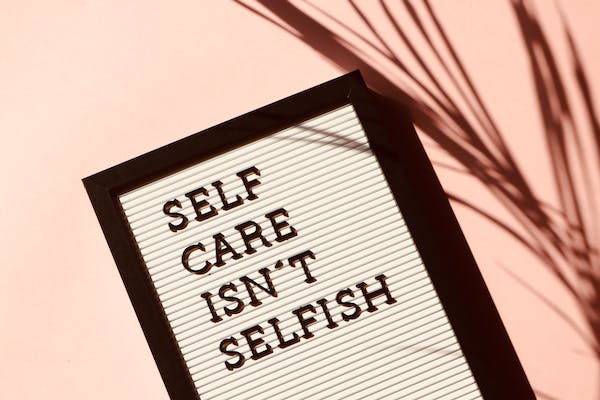
How to Improve Your Mental Health Quickly
“Happiness can be found even in the darkest of times, if one only remembers to turn on the light.”—Albus Dumbledore
When mental illness strikes, it is a cause of great sadness to those affected.
Yet there is no need for a family to feel shame when this happens.
Nevertheless, you want to know how your health can best restore your health.
The good news is that there are several tips you can use to improve your mental health quickly, including:
- Practice deep breathing
- Engage in physical activity
- Connect with others
- Limit exposure to stress
- Get enough sleep
- Practice self-compassion
This article will discuss each of these six ideas in detail.
But first.
What is good mental health?
Good mental health is a state of emotional, psychological, and social well-being where you feel good and function well.
With good mental health, you can cope with the everyday stresses of life, work productively, build positive and meaningful relationships, and contribute to your community.
Good mental health also involves having a positive outlook on life, a sense of purpose, and the ability to manage emotions, thoughts, and behaviors in a balanced manner.
However, good mental health is not the absence of challenges or negative emotions but rather the ability to navigate through them healthily and constructively.
Just like physical health, mental health is a continuum, and individuals may move through this spectrum based on life events and circumstances.
Let’s begin discussing tips to improve your mental health quickly.
Tip#1: Practice Deep Breathing
Deep, slow breaths can help calm the nervous system and reduce stress.
I have read study after study on the numerous benefits of deep breathing.
Here are the instructions as reported on WebMD.com:
- Find a comfortable, quiet place to sit or lie down. Keep your back straight and your feet flat on the floor if sitting. Close your eyes.
- Place one hand on your belly, just below your ribs. Place the other hand on your chest.
- Take a regular breath.
- Now take a slow deep breath. Breathe slowly through your nose. Pay attention to how your belly swells up under your hand.
- Holding your breath, pause for a second or two.
- Slowly breathe out through your mouth. Pay attention as the hand on your belly does in with the breath.
- Do this seven times until you have a calming rhythm.
- Now, add images to your breathing. When you inhale, imagine that the air you’re breathing spreads relaxation and calmness throughout your body.
- As you exhale, imagine that your breath is whooshing away stress and tension.
- Try deep breathing for ten minutes until you feel relaxed and less stressed. Gradually work your way up to fifteen to twenty minutes.
If you’re frazzled and don’t have twenty minutes to destress, even a few deep breaths can help.
Once you’ve practiced it a few times, a mini-version of this exercise can help ease tension.
Just imagine each breath is sweeping away stress, and you may calm your anxiety in just a minute or two.
(Source: WebMD.com)
Some of the benefits of deep breathing include the following:
- It relaxes the mind and body, which reduces stress.
- It improves posture.
- It lowers blood pressure.
- It relieves pain.
- It increases digestion and assimilation of food.
- It clears emotional problems (diverts your mind from worrying or dwelling on grievances).
- It improves the nervous system.
- It strengthens the lungs (sometimes called “house cleaning for the lungs”).
- It makes the heart stronger.
One quick exercise you can use to calm your nerves is called the 7/11 breathing exercise, where you focus on your breath and your mind:
- Count to seven as you breathe in
- Count to eleven as you slowly breathe out.
You will immediately feel more relaxed.
Practice this exercise whenever you feel anxious or stressed. It works!
(Source: A Family Caregiver’s Guide: 7 Secrets to Replace Negative Triggers with Positive Emotions)
Tip #2: Engage in Physical Activity
Exercise has positive effects on mental health.
Even a short walk or some light stretching can boost and reduce anxiety.
Exercise has numerous positive effects on mental health. Its benefits are well-documented by scientific research.
Here are but a few ways exercise can improve your mental well-being:
- Release of Endorphins: Physical activity triggers the release of endorphins, chemicals in the brain that act as natural mood lifters. They help reduce stress and anxiety while promoting well-being and happiness.
- Reduction of Stress and Anxiety: Regular exercise can help reduce the levels of stress hormones, such as cortisol, in the body. It can also provide a healthy outlet to release tension, helping to alleviate anxiety symptoms.
- Improved Sleep: Regular physical activity can lead to better sleep patterns. Quality sleep is crucial to your mental health, allowing the brain to rest and repair itself, improving overall mood and cognitive function.
- Enhanced Cognitive Function: Exercise improves cognitive function and memory. It can also boost focus and attention, leading to increased productivity and a better ability to cope with daily challenges.
- Boosted Self-Esteem: Regular exercise can enhance body image and self-esteem. As you achieve your fitness goals and experience improvements in physical health, you often gain a more positive perception of yourself.
- Distraction from Negative Thoughts. Engaging in physical activity can temporarily distract from negative thoughts and ruminations, helping break the cycle of negative thinking.
- Reduced Risk of Depression: Studies have shown that regular exercise can reduce the risk of developing depression.
It is important to note that while exercise can be a valuable tool for promoting mental health, it is not a substitute for professional mental health care when you need it.
If you are experiencing severe or persistent mental health issues, seeking help from a qualified mental health professional is essential.
But if you choose exercises you enjoy and feel comfortable doing, you will stick to a regular exercise routine.
As noted earlier, regular exercise will make you feel good and can do nothing but benefit your mental health.
Tip #3: Connect with Others
Social support is crucial for mental well-being.
Reach out to friends, family, or support groups.
When I cared for my ill husband 24/7, I would have been lost without my caregiver’s support group to bounce off ideas and get encouragement from others.
Talking to others you trust about your feelings can be good.
Here are a few ideas to help you connect with others:
- Active listening: When conversing, focus on the person speaking and listen actively. Ask follow-up questions, nod, and show empathy to demonstrate a genuine interest in what they have to say.
- Find common interests: Discover shared hobbies, passions, or experiences that can serve as conversation starters. Shared interests help establish rapport and create a strong foundation for a connection.
- Be authentic: Be honest. Be yourself and express thoughts and feelings honestly. Authenticity helps build trust and allows others to feel comfortable around you. Everybody hates a phony! I know I do.
- Volunteer and participate in activities: Engage in community events, clubs, or volunteer opportunities to meet like-minded people and bond over shared goals.
- Use social media mindfully: Social media platforms can help you connect with others, but use them mindfully and respectfully. Engage in meaningful conversations, share valuable content, and avoid toxic or harmful interactions.
- Attend networking events: Attend community networking events online or offline to meet new people with similar interests or professional backgrounds.
- Give compliments: Compliment others sincerely when you notice their achievements, skills, or positive traits. A genuine compliment can go a long way in establishing connections.
- Stay open-minded: Be open to meeting people from different backgrounds and cultures. Embrace diversity and appreciate the unique perspectives others bring to the table.
Remember that building connections takes time and effort.
Be patient, and don’t be discouraged by initial challenges.
Focus on building meaningful, genuine relationships, and the connections will grow.
Connecting with others will help improve your mental health if you feel out of sorts.
Tip #4: Limit Exposure to Stress
Stress, stress, stress!
Almost everyone is stressed out these days.
Limiting stress is one of the most important ways to improve mental health.
Exactly, what is stress?
“Stress can be defined as a state of worry or mental tension caused by a difficult situation. Stress is a natural human response that prompts us to address challenges or threats in our lives.”—World Health Organization (WHO)
You will find many, many articles on the web on how to manage stress.
Here is one on my website that discusses effective ways midlife women can control stress: https://goldenpenllc.com/?s=stress
Some psychologists say there are three (3) levels of stress.
Other experts say there are four (4) levels of stress.
And still, others maintain there are five (5) phases of stress.
But no matter how you define what stress is and what stress is not, this article will suggest strategies to limit exposure to the amount of stress that can cause great harm to your physical body and mental well-being:
- Identify stressors: Understand the specific things that trigger stress in your life. It could be work-related, personal relationships, financial pressures, or other factors.
- Set boundaries: Learn to say no to additional commitments when overwhelmed. Prioritize your well-being and protect your time and energy.
- Time management: Create a schedule that balances work, personal life, and leisure activities. Prioritize tasks and focus on the most important ones first.
- Practice mindfulness and meditation: Engage in meditation or mindfulness practices to help you stay present and reduce anxiety about the future. Here’s an article on my website that can help: https://goldenpenllc.com/?s=mindfulness
- Regular exercise: Physical activity is a great way to reduce stress and improve mood. Even a short walk or a quick workout can make a significant difference.
- Healthy diet: Eat a balanced and nutritious diet, as certain foods can help regulate stress levels.
- Get enough sleep: Prioritize sleeping 7-9 hours each night, as lack of sleep can increase stress levels.
- Limit exposure to negative influences: Minimize exposure to negative news, social media, or toxic relationships that can contribute to stress. So important!
- Seek professional help: If stress overwhelms your daily life, consider talking to a mental health professional who can offer guidance and support.
Managing stress is a continuous process, and finding what works best for you is essential.
Different strategies may be more effective for other individuals.
So, be patient and give yourself time to discover what helps you the most.
Moving on
Tip #5: Get Enough Sleep
Ahh, sleep!
I have written about this topic in stand-alone articles so many times.
Why?
Better sleep, better health.
I cannot overstate the importance of sleep.
Not getting enough sleep harms the body.
Sleep is a fundamental physiological process for maintaining good physical health, mental well-being, and overall quality of life.
Consider these key reasons you should prioritize sleep:
- Restoration and Healing: During sleep, the body goes into rest and repair. Sleep rejuvenates tissues and muscles and strengthens the immune system, which aids in healing and recovery from illness and injury.
- Brain Function and Cognitive Performance: Sleep plays a vital role in cognitive functions such as memory consolidation, learning, problem-solving, and creativity. It helps the brain process information and connects different pieces of knowledge.
- Emotional Regulation: Sufficient sleep links to better emotional regulation and mental stability. Lack of sleep can lead to mood swings, irritability, and an increased risk of developing mental health disorders like anxiety and depression.
- Physical Health: Adequate sleep is associated with a reduced risk of several chronic health conditions, including heart disease, diabetes, obesity, and hypertension. It also supports healthy metabolism and weight management.
- Immune Function: Proper sleep enhances the immune system’s ability to defend the body against infections and illnesses.
- Safety and Alertness: Sleep is vital for maintaining daytime alertness and focus. Sleep deprivation can impair cognitive function and lead to accidents and errors.
- Memory Consolidation: During sleep, memories and information from the day are processed and consolidated, contributing to better retention and recall.
- Stress Reduction: Quality sleep helps reduce stress and allows the body to recover from daily stressors, enhancing resilience to future challenges.
Overall, adequate and quality sleep is crucial for overall health, well-being, and optimal daily functioning.
How much sleep?
The National Sleep Foundation recommends that adults aim for 7-9 hours of sleep per night. While specific, sleep needs can vary for individuals based on age, lifestyle, and other factors.
Tip #6: Practice Self-Compassion
Self-compassion is a concept developed by psychologist Kristin Neff. It refers to treating oneself with kindness, understanding, and acceptance, particularly in the face of personal shortcomings, failures, or difficult life situations.
Self-compassion also involves acknowledging one’s imperfections and mistakes without harsh self-judgment or self-criticism.
Self-compassion is a way to relate to oneself in a caring, supportive, non-judgmental manner, similar to how one might treat a close friend going through a tough time.
Be kind to yourself.
Research has shown that practicing self-compassion can lead to various psychological and emotional benefits, including reduced anxiety and depression, increased resilience, improved self-esteem, and more adaptive coping strategies.
By cultivating self-compassion, you can develop a healthier relationship with yourself and foster overall well-being and mental health.
Conclusion
So, there you have it.
In this article, you will find six tips or recommendations you can use today, right now, and to quickly improve your mental health.
But remember, mental health improvement is a journey, and taking small steps like those described in this article is okay.
But if you struggle or face significant challenges, don’t hesitate to seek professional help to address your concerns.
Key Takeaways
To Improve Your Mental Health Quickly:
- Practice deep breathing.
- Engage in physical activity,
- Connect with others.
- Limit exposure to stress.
- Get enough sleep.
- Practice self-compassion.
Why not begin today??
“You’ve been criticizing yourself for years and it hasn’t worked. Try approving of yourself and see what happens.”—Louise L. Hay
Start now!!!




